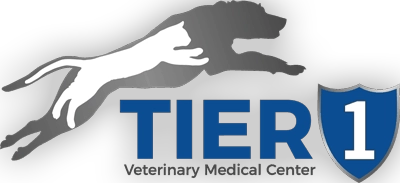Dental Care
at Tier 1 Veterinary Medical Center
Comprehensive Oral Health for Your Pets
Common Dental Problems in Pets
Pets, especially dogs and cats, can develop several dental problems that, if left untreated, can lead to serious health issues. Common dental problems include:
- Periodontal Disease: The most common dental condition in dogs and cats, which occurs when plaque and tartar build-up leads to inflammation of the tissue surrounding the teeth.
- Tooth Decay and Loss: Untreated cavities can lead to severe tooth decay, pain, and tooth loss.
- Gingivitis: Inflammation of the gums caused by plaque buildup, which can become a more serious periodontal disease if not treated.
- Oral Infections: Bacteria from the mouth can lead to systemic infections affecting the heart, liver, and kidneys.
Preventive Dental Care
Preventive care is vital to maintaining your pet’s oral health. At Tier 1 Veterinary Medical Center, we recommend regular dental check-ups and cleanings to prevent the development of dental diseases. Our preventive services include:
- Regular Dental Exams: Annual or bi-annual exams to catch and treat dental issues early.
- Teeth Cleaning: Professional cleaning to remove plaque and tartar build-up.
Dental X-rays: To detect problems below the gum line and assess the health of jaw bones and tooth roots. - Home Care Education: Guidance on how to brush your pet’s teeth and other home care tips to maintain oral health.
Things to Never Allow Your Dog to Chew On
While chewing is a natural behavior for dogs, certain items can be harmful to their dental health:
- Bones and Antlers: These hard materials can cause broken teeth, oral injuries, or can become lodged in the digestive tract.
- Ice Cubes: Regular chewing on ice can lead to tooth fractures.
Hard Plastic or Nylon Chew Toys: Some of these materials can be too hard, leading to tooth damage. - Sticks: Wood can splinter, causing gum injury or intestinal blockages if swallowed.
Frequency of Dental Cleanings for Pets
Maintaining your pet's dental health is crucial for their overall well-being. Regular dental cleanings are an essential part of this care. The frequency of dental cleanings can vary based on several factors, including your pet's age, breed, diet, and overall health. Here are general guidelines to help you understand how often you should have your pet's teeth professionally cleaned:
- Annual Cleanings: For most adult dogs and cats, a professional dental cleaning once a year is recommended. This routine helps prevent the buildup of plaque and tartar, which can lead to serious dental diseases.
- More Frequent Cleanings for Certain Breeds: Some breeds, particularly small breeds of dogs and those with brachycephalic (flat-faced) features, are more prone to dental issues and may require more frequent cleanings. These breeds often have teeth that are closer together, which promotes quicker plaque buildup. Your veterinarian might recommend cleanings every six months for these pets.
- Young and Senior Pets: While younger pets might not need cleanings as frequently, starting dental hygiene practices early is crucial. For senior pets, more frequent dental assessments are advisable, as they are more prone to dental decay and other related health issues.
- Pets with History of Dental Issues: If your pet has had previous dental problems or periodontal disease, your veterinarian may suggest more frequent dental cleanings and check-ups to manage these conditions effectively.
- Signs that Dental Cleaning is Needed Sooner: If you notice bad breath, visible tartar on the teeth, red or swollen gums, difficulty eating, or pawing at the mouth, it’s important to schedule a dental check-up right away, regardless of when the last cleaning was done.
Regular veterinary check-ups are the best time to discuss your pet’s dental health and determine the appropriate frequency of dental cleanings. Your vet can give you personalized advice based on the specific needs of your pet.
By adhering to a regular dental cleaning schedule, you can help ensure that your pet remains happy, healthy, and free of painful dental problems.
